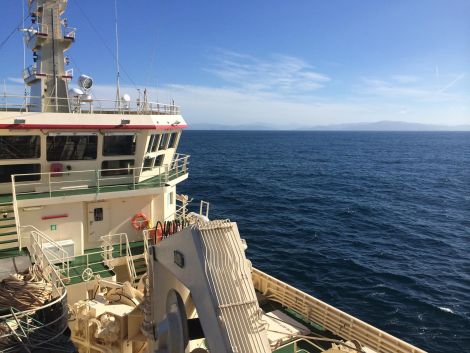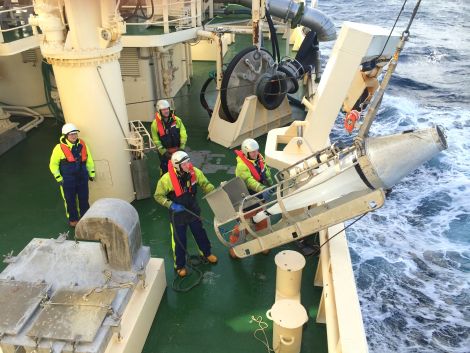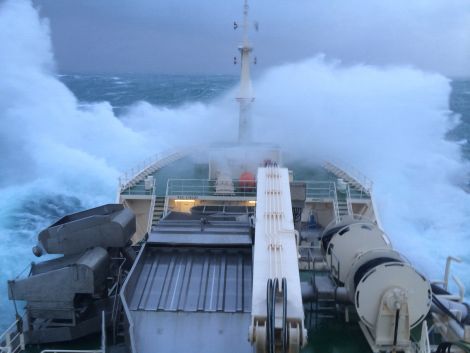News / Trip to sunny calms of Spain for Altaire
SHETLAND fishing trawler the Altaire has been enjoying a bit of warm sunshine in the Bay of Biscay this week as it helps Marine Scotland scientists to conduct a research survey.
The vessel hit big seas with wind speeds of 90 knots off the west of Ireland en route to the sunny calms of Spain, just off the cost of San Sebastian.
Fisherman Colin Leask says the Altaire has been helping Marine Scotland scientists, who carried out on operation on deck in their container lab looking for mackerel eggs.
The boat previously wroked with Marine Scotland on a mackerel egg survey from west of St Kilda down to the south west of Ireland back in 2013.
Leask says he feels relations between fishermen and marine scientists are “finally changing” for the benefit of all, including the Fishing industry and the fish stock.
“For far too many years, both sides battled year in year out, with both fishermen and scientists sure they were right, and the other wrong, in their staunch beliefs on the size of fish stocks,” he says.
“Fishermen being accused of over-exaggerating on what they were claiming to see, while fishing just to secure a decent cut of quota allocation from the following year’s TAC [total allowable catch] from Brussels, and not looking any further ahead as the next year – and the other side of the table were scientists being accused by fishermen of being over-cautious, and not seeing what was really out here.”
With the two sides locking horns, “nine times out of ten science would walk from the table triumphant, leaving the fishermen with no wind in their sails”, Leask says.
Fishermen have often been accused of being greedy, but it is not in their interests to “deliberately dissolve away the very thing that they love to do, and earn their living from”.
Become a member of Shetland News
“The truth is, in terms of pelagic stocks, long term management plans have been agreed between fishermen, scientists and managers, which have been implemented providing a framework for fisheries management,” Leask says. “In our case the Marine Stewardship Council, the market leader in independent fisheries assessment, has certified most of our fisheries as sustainable and well managed, which demonstrates our stocks to be healthy.
“Fishermen have a good sense of present stock levels, and scientists believe they can predict what will be there in the future. The problem before in years past was neither side knew – nor want to know – the true knowledge and experience of what the other side had gained over years of hard toil until these recent years.”
He says fishermen have “vast, invaluable knowledge of what’s happening on the ever-moving fishing grounds” including “what quantity of different species are on the grounds at certain times of year”.
Scientists, on the other hand, have “an ever-growing knowledge of the science surrounding the stocks, from the reproductive cycles to life expectancy, studying all species throughout their life, from an egg to spawning to death, and much, much more associated biology from our fished stocks. By joining these together makes the optimum team for stock assessment”.
For decades scientists have assessed the mackerel stock using a triennial survey, which counts egg production from the Norwegian Sea to the Bay of Biscay. This is the most expensive survey carried out given the area involved and the time spent surveying, Leask says; seven nations participate.
ICES (International Council for the Exploration of the Sea) says its last two surveys have hit peak egg production numbers at the start of the survey. The European pelagic industry has been working together with scientists in a project to find out the optimum period to begin the next full survey – to be carried out in 2016.
This pre-egg survey is the result of collaborative work between the European pelagic industry and scientists. Holland carried out the first survey in December, Denmark surveyed in January, followed by Ireland in February with Scotland undertaking the final survey in March.
The fishing industry is also working with scientists on a mackerel tagging project, which will feed into scientific assessments in the coming years. The Norwegian Marine Institute tags around 20,000 tonnes of mackerel every year in the Celtic Sea using RFID electronic tags. Industry-funded tag readers are all fitted in Scottish processing factories.
All the mackerel catches are screened when landed with mackerel tags read automatically when passing by the tag reader. This information is automatically sent to Norway for analysis and will be used in the ICES assessment, which will provide important biological information.
Scottish pelagic vessels played a major part in the 2013 egg survey by undertaking two of the key cruise surveys and will likely do this again in 2016. For the last four years Scottish pelagic boats have carried out the extensive summer herring acoustic survey in conjunction with the Marine Scotland science research vessel Scotia.
“Hopefully we will continue to work closely together as a team, joining our array of knowledge, and begin putting the pieces of the complicated and ever-changing fish puzzle together to help sustain all targeted fisheries,” Leask says, “and give confidence in our truly great industry for future generations ahead of us to enjoy and earn from – keeping stocks healthy and communities alive, which has to be a huge incentive to work as one and not ‘us and them’.”
He continues: “Even with all the detailed science and co-operation with the Fishermen there’s still issues to iron out to truly accept the final scientific figures of estimated tonnage of our stocks against the reported landed tonnage.”
Leask says fishermen remain concerned following a “large increase of foreign vessels now given access into our precious waters”. He hopes Marine Scotland will now look to demonstrate a “more physical presence on the grounds through the fishery season, with a heavier-handed policing control, as still more than half the foreign vessels are leaving our waters to land in their home ports on trust, without having their RSW [refrigerated sea water] fish tanks monitored”.
He adds: “Tight control will ensure their access isn’t being abused, and will also give a true and official landed tonnage from all vessels fishing in our waters, so the scientific figures collected can give as accurate figures as possible for our valuable stocks.
“But now we’re working together on carrying out joint surveys using knowledge, experience and science as one, it can only lead to a better, healthier, secure future for our industry.”
Become a member of Shetland News
Shetland News is asking its readers to consider paying for membership to get additional perks:
- Removal of third-party ads;
- Bookmark posts to read later;
- Exclusive curated weekly newsletter;
- Hide membership messages;
- Comments open for discussion.
If you appreciate what we do and feel strongly about impartial local journalism, then please become a member of Shetland News by either making a single payment, or setting up a monthly, quarterly or yearly subscription.






























































